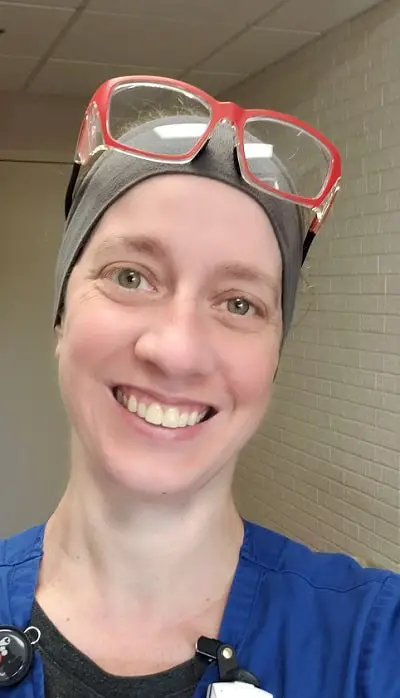Day in the life of
Registered Nurse – Molly Foss

My name is Molly Foss and I’m a Registered Nurse. I’ve been a nurse for 11 years. I have my 2 year ADN degree, my 4 year BSN degree, and I’m certified in ACLS (Advanced Cardiac Life Support). I am also a Charge Nurse and a Preceptor on my floor and I’m our representative at the Clinical Informatics committee.
My typical day
A “typical day” is something we don’t really have, but I can run you through the basics.
I work with Trauma patients near a major US city, so we take care of all injuries caused by something damaging someone. Car crashes, falls off ladders, assaults, stabbings, shootings, motorcycle crashes, diving accidents, etc.
I don’t work in the ER or ICU, we have a dedicated trauma floor that cares for all of these patients once they’ve been through the ER and/or come out of the ICU.
My floor is also considered “specialty care” so we take care of patients who have had massive facial surgeries for mouth or throat cancer and we take care of reconstructive plastic surgery patients who have had skin grafts, muscle flaps or fingers/hands/toes reattached.
A basic day shift starts by getting reports from the night shift on my 3-4 patients for the day. I’ll try to meet the patients with the night shift RN so the patients can visually see the handoff, it honestly makes patients feel more secure when they SEE you passing on information.
Then I finish looking up the info I need for my shift. This includes scheduled medication times, which patients can have “as needed” medications and when, scheduled tests and procedures, lab values, and physical therapy times.
After that, I triage my group of patients and decide who I am going to see first for morning medications. Usually, this sorts itself out when meeting patients with night shift. I know who is wide awake and ready to go, I know who wants to sleep a bit more and I know who might need pain medications right away.

Omnicell Automated Medication Dispensing Cabinet System
I see my most difficult patients last. Someone who needs their 20 pills fed to them one at a time with a bite of pudding is going to take the longest, so I get my easier patients settled right away so I can spend more time with the complicated patient.
After that no shift is typical. Patients have tests and therapies at all different times. Patients will refuse tests and therapies causing me to scramble and shift everything around to accommodate. Patients who I thought were getting ready to discharge will have something happen so they need to stay a few more hours or another night entirely.
Being a nurse isn’t about having a “Plan A”, it’s about what you’re going to do with “Plan F or G”. You need to be flexible and able to roll with interruptions and changes all shift long.
The basic things I need to do in my shift are a full head-to-toe assessment of each patient including a full skin check, to prevent pressure sores from starting. I need to stay up-to-date on their vitals and lab values (Nursing assistants get vitals for me and report back if they’re not within normal limits), and possibly give medications if their vitals are not within the defined limits.
I need to make sure my patients have their pain at a tolerable level and medicate them as appropriate to maintain that.
Most dressings from surgical incisions or other wounds need to be changed once a shift, so I do that between patients eating, having therapies, and resting.
All their attached lines need to be managed, feeding tubes, trachs, chest tubes, catheters, IVs, abscess drains, and oxygen. Everything that goes into or comes out of those tubes needs to be accurately documented.
I need to ensure patients are eating, using the bathroom, shifting their weight at least every 2 hours, which nursing assistants can help me with, but ultimately it comes down to me if it’s not done.
If patients have abnormal vitals or pain that I can’t control with the medications that are ordered I need to page the doctor or NP working with that patient. If everything is going well I still need to check in with the doctor to communicate the patient’s plan and what things need to be completed before the patient can discharge.
Everything I do needs to be accurately charted as the shift goes on and by the end of the shift I need to write a shift report note so the next shift can be up-to-date on what happened.
We are also constantly educating patients and their families. Not just on obvious things like “this is how you need to wear your cervical collar” but also on things like “this is why it’s important to participate fully with physical therapy and not send them away so you can sleep for 30 more minutes”.
Pros
The pros of my job are the obvious ones. When patients come in they’ve either just come up from the ER or out of the ICU and they’re obviously not doing well or they wouldn’t be in the hospital.
When I first meet them they’re usually having a really bad day. It’s amazing to meet someone who just broke their leg and is in crazy amounts of pain and within 1-2 days see them go to surgery to get their fracture fixed and advance from taking 1 step from the bed to the recliner to walking in the halls with therapy the next day.
I once had a patient come to me from the ICU, he was confused, couldn’t remember how to eat so he had a feeding tube. Since he was confused he was also restrained so he wouldn’t pull the feeding tube out. In my 3 day stretch at work, he went from confused and restrained with a feeding tube, to eating on his own and joking with me. It’s amazing and so rewarding to see patients progress like that. It’s very rare that it happens that quickly, but it’s an honor to be part of that process.
Cons
Some of the drawbacks of being a nurse are the same as other jobs, having to deal with inter-department communication (why is CT calling me and asking about the scan that the MD ordered instead of calling the MD directly) and difficult coworkers.
But the specific things to my job are things like patients who are absolutely unreasonable. Patients will swear at nurses, I’ve had things thrown at me and I’ve had confused patients attempt to hurt me. I’ve had patients dictate every little aspect of their day, which doesn’t sound that bad, but I’m talking there are people who will verbally abuse you because their water mug wasn’t in the exact spot they wanted it on their table.
It’s a physically exhausting job, patients on my floor need a lot of help moving and people come in all shapes and sizes. Turning a patient onto their side who weighs 350+ pounds is a 3 person job and we often only have 2 people to do it.
It’s also a mentally tough job. I meet people who attempted suicide and now have to live with the physical and mental scars of that. I care for people who drove drunk and crashed their car and they may have hurt or killed other people in the process. We take care of patients who were on a motorcycle with their loved one and only one of them survived the crash. And I have to treat all patients with the same level of caring and dignity.
If you’re looking to go to nursing school, you need to be not only compassionate and caring but also flexible, understanding, and a good problem solver. You don’t necessarily need to be ok with the “blood and guts” aspect of nursing, there are many areas that care for patients who don’t have giant wounds that need to be cleaned out.
Registered Nurses
assess patient health problems and needs, develop and implement nursing care plans, and maintain medical records. Administer nursing care to ill, injured, convalescent, or disabled patients. May advise patients on health maintenance and disease prevention or provide case management. Licensing or registration required.


.jpg)